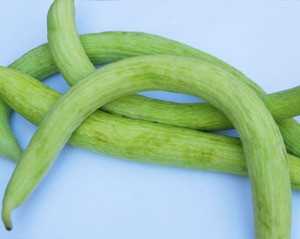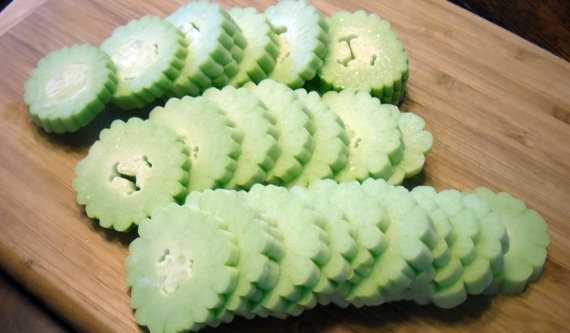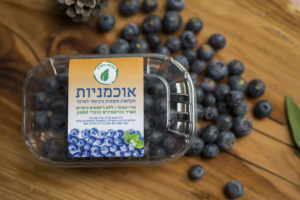Blueberry season in Israel lasts around two months. To mark the midseason celebration, super blueberry growers Gadi and Tamir are offering more economical, ecological 1/2 kg packages in addition to the small 125 gr packages available.
Blueberry prices: 125 gr – 20 NIS 1/2 kg – 74 NIS
Celebrate! Use our order system to add these treats to your vegetable boxes.
_________________________________________
The flowers appear on the earth; the time of the Fakus has come!
In perfect calibration with Shavuoth, Chubeza’s field is now decked out with new springtime arrivals. Over the last two weeks, we harvested our first beds of fakus, aka “Arabic cucumber.” In response, we now await the annual barrage of queries that begin something like, “This week I received two portions of zucchini and no cucumbers!” So for those whose boxes may contain fakus and not cucumbers, let me offer this handy key to distinguishing between a fakus and a zucchini, which I learned from our longtime client Tzipi from Jerusalem: the fakus stem resembles that of a cucumber, not zucchini! If you received a light-colored elongated vegetable that kind-of-resembles-zucchini-but-also-kind-of-doesn’t, check out its stem (the part where it attaches to the plant): if it is wide and star-shaped like a zucchini, well… it’s a zucchini. If it’s thin and willowy like a cucumber, then say hi to our friend the fakus.
Here, ladies and gentlemen, is The Fakus in all its glory:

At the heat of the day in the scorching Sinai desert, the Israelites craved the Egyptian fare, reminiscing, “We remember the. . . . cucumbers, and the melons…” (Numbers 11, 5). The “cucumbers” they missed were most probably the fresh fakus. And to be honest, I totally understand them. Fakus is definitely worth pining for. Thus, every summer, we descendants of those Egyptian exiles are proud to bring to you the vegetable hankered by our great-great-great-great-great-great-greeeaaaaaat-grandparents….
Tiberius Julius Caesar Augustus was also known for his fondness for cucumbers. He would eat cucumbers every day of the year, necessitating the Roman farmers to develop artificial methods to grow the vegetable year-round. According to Historia Naturalis by Pliny the Elder (Book XIX, Chapter 23), “Indeed, he [Tiberius] was never without it [cucumber]; for he had raised beds made in frames upon wheels, by means of which the cucumbers were moved and exposed to the full heat of the sun; while, in winter, they were withdrawn, and placed under the protection of frames glazed with mirrorstone.”
However…
Tiberius was probably not munching on the cucumber we all know and love, i.e., the Cucumis Sativus, but rather on the light and somewhat hairy fakus, aka Armenian cucumber. And today’s surprising revelation: The fakus is in fact …a melon. Also coined the “snake melon,” on account of its looks, in botanical terms this is the Cucumis melo var. flexuosus melon. However, we do not let the fakus mature like our melons—we pick it in its crunchy sweet youth, like the cucumbers (which is a good thing, really, because the fakus just would not ever become a real tasty melon at full maturity). There are all sorts of fakus varieties grown worldwide: light green, striped, long and curved, or short and light like a cucumber. At Chubeza we grow two types of the light-colored variety: the small fakus, about the length of a cucumber, and one which is long and curved.
Melons and cucumbers belong to the same family, but they are two different entities with diverse characteristics. When you look at the leaves, you can tell that fakus leaves are rounder and less serrated, similar to their melon brothers. Its flavor and appearance are closer to the cucumber, but not really: the fakus is not thorny at all. It is covered with soft fuzz and is sweeter and crunchier than the cucumber. However, like the cucumber, it is picked in its youth, before its seeds mature, which is why it is not as soft as a melon.

Like the cucumber, the fakus sometimes tends to be bitter. Various attempts to overcome this bitterness have proven that we must carefully choose the plants whose seeds are to be kept for next year, making certain that they are non-bitter plants. We hope you will not receive a bitter fakus, but to be on the safe side, when you slice them up into a salad, first nibble at the point where the fakus was attached to the plant. That’s where the bitterness begins. If you like what you taste, slice away. If it’s bitter, take a bite further down. Sometimes the bitterness remains contained at the end…
The fakus is lauded by chefs as part of the trend to return to local, homegrown “baladi” food of the past. It does resemble the cucumbers enjoyed here in bygone years, prior to the arrival of the garden cucumber. Several years ago we were visited by Dr. Moshe Ra’anan, who has written many articles about plants and animals in the Bible. He photographed our nice fakus varieties and wrote a few words about them (in Hebrew). I learned from him that during the Mishnaic period there was actually a verb “to fakus” (“לפקס”), related to the ripening of the fakus. Our commentators offered two different interpretations for its definition: 1. the stage at which the fuzz is shed from the fruit, or 2. the stages at which the flower dries up and falls from the fruit.
Either way, when the fakus’s are fakused, you can wash, slice, add some salt if desired and joyfully bite into it, or you may preserve it, just like a cucumber, producing delicious pickles, and even fry or stuff it like a zucchini. And all this while being …a melon!
Check out our recipe section for some delectable fakus recipes.
Confused? That’s ok, just enjoy the fakus and Bon Appetite!
Many of you may have noticed that the transition period between winter and summer produce includes a few “bummer” weeks when the winter vegetables are almost done but the summer veggies haven’t yet gotten their acts together. The cabbage is small, the beets are at the end of their line and therefore smaller, and broccoli, cauliflower, fava beans, fennel and kohlrabi are no more… On the other hand, zucchinis are making their debut to be followed by small squash varieties and fakus, but the rest of the vegetables (lubia, eggplant, squash, peppers and corn) are not mature enough to be harvested just yet. Cucumbers and tomatoes are also scarce – in general, the hothouse vegetables are diminished in number over the transition period – the winter rounds are over, and it takes some time till the summer veggies begin to produce nice big yields. Therefore, we were forced to supplement our tomato and cucumber supply by purchasing from other organic farms, and since our situation is prevalent in all fields, the prices are very high, making the quantities smaller.
In time, the transition period evolves into summer, of course. Our tomatoes have already entered a serious growth spurt. In order for us to expand quantities, the fakus crop will come to the fore, and in the weeks to come your boxes will contain either fakus or cucumber quantities.
The significance of purchasing vegetables from a CSA (Community-supported agriculture) like Chubeza is that your purchase allows us the stability and confidence to work year-round. Together we enjoy the abundant products of the peak of summer and winter, and the unique vegetables which are usually more expensive (e.g., peas, Jerusalem artichoke and green fava beans in wintertime, and corn, lubia and others in summertime), and together we go through the sparser transition periods. Now, as your boxes begin to fill up with new vegetables and the first fruits of spring and summer, we thank you again for your ongoing support.
This week Mohammed, Majdi and Ali returned to work after almost two months of Corona-distancing that included Ramadan and Id El Fitr. Welcome Back! In turn, we bid our farewell to the two workers who came to pinch-hit and just now returned to their previous jobs. We are full of gratitude for their help over this remarkably busy period.
Wishing you a good week,
Alon, Bat Ami, Dror, Orin and the Chubeza team
______________________________________
WHAT’S IN THIS WEEK’S BOXES?
Monday: Zucchini, potatoes, beets, fakus/cucumbers, tomatoes, acorn squash/Napoli squash, cherry tomatoes/yellow string beans, parsley/coriander, lettuce, melon.
Large box, in addition: Bell peppers/cabbage, scallions/garlic, New Zealand spinach/Swiss chard.
FRUIT BOXES: Bananas, peaches, nectarines. Large box, in addition: Cherries
Wednesday: Zucchini, potatoes, beets, fakus/cucumbers, tomatoes, acorn squash/Napoli pumpkin/butternut squash, parsley/coriander, lettuce, New Zealand spinach/Swiss chard, scallions/garlic/leek. Small boxes: cherry tomatoes/yellow string beans/carrots.
Large box, in addition: Bell peppers/melon, eggplants/peppers, yellow string beans, carrots.
FRUIT BOXES: Bananas, peaches, nectarines. Small box: Cherries. Large box, in addition: Apricots


